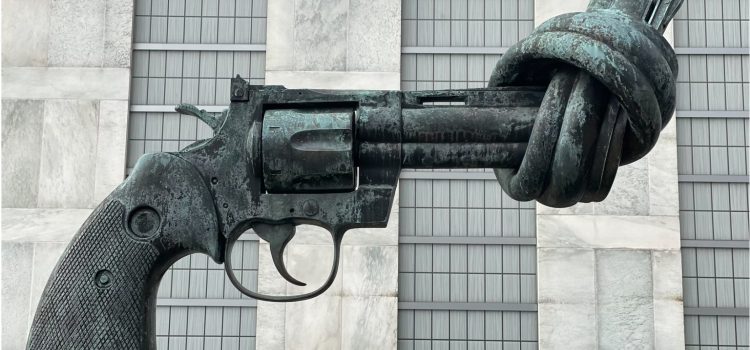
This is a free excerpt from one of Shortform’s Articles. We give you all the important information you need to know about current events and more.
Don't miss out on the whole story. Sign up for a free trial here .
Why are background checks important for gun purchases? Does this system really help to prevent gun violence?
The background check required before a gun sale is meant to keep guns from falling into the wrong hands. However, critics of the background check system point out flaws like private sale loopholes and incomplete or incorrect data on potential gun buyers.
Keep reading for an overview of background checks for gun control and whether the system is working or broken.
Are Background Checks Helping Gun Control?
Since 1993, all firearms dealers have been required to consult the National Instant Criminal Background Check System (NICS) to verify that a prospective customer is legally eligible to own firearms before selling a firearm to that customer. Under the system of background checks for gun control, any adult with a sound mind and a clean record is eligible to buy a gun in the United States. The intent of the system is to reduce crime by preventing criminals and people with mental health problems from buying guns.
But are NICS background checks effective for gun control—do they really help to keep guns from falling into the wrong hands? As with almost anything related to guns in the US, it depends on who you ask. But, perhaps surprisingly, the more radical voices on both sides of the gun control / gun rights debate argue that NICS is defective:
- Advocates of gun control argue that NICS should be overhauled to make evaluations more thorough and more restrictive because the current system has too many loopholes to be effective.
- Advocates of gun rights argue that the requirement for firearms dealers to perform background checks using the NICS should be repealed because the system is basically useless for keeping guns out of the hands of criminals, but can be burdensome to people who are lawfully purchasing firearms.
Supporters of NICS (in its current form) come from the region of the political spectrum in between these two extremes. They might argue that the NICS represents an optimal compromise, making it harder for criminals to obtain firearms without creating an undue administrative burden. Yet this moderate position rarely receives much press.
In this article, we’ll provide an overview of the limitations of the NICS that both sides point to. First we’ll look at the problems of incomplete and inaccurate data in the system. Then we’ll discuss the exceptions for private gun sales, including the so-called “internet loophole” and “gun show loophole.” Finally, we’ll discuss black-market sales, and then round out our discussion with a synopsis of the different perspectives on how to address NICS’s limitations. Some states have additional background check requirements that go above and beyond NICS, but we’ll only cover the federal system in this article.
Incomplete Data
Background checks for gun control are only as good as the data that’s in the NICS system, so the first problem is that the data in the system is not always complete. NICS only records data that would prohibit a person from owning firearms, so incomplete data could result in inappropriate approval of a firearm purchase.
The NICS database is administered by the federal government. But when a person is convicted of a crime, diagnosed with mental illness, or otherwise prohibited from owning firearms, usually it’s by state or local authorities. Currently, all 50 states voluntarily provide relevant information to the federal government to keep the system up to date.
But critics of the system express concern that not every crime or diagnosis actually gets reported. Some sources report that as much as 25% of criminal convictions don’t make it into the system, and they conjecture that the reporting rate is even lower for mental health records.
Incorrect Data
The data that does get entered into NICS isn’t completely accurate either and is sometimes misinterpreted when running a background check. For example, background checks for gun control will sometimes result in a denial of sale just because the prospective gun buyer’s name gets confused with the name of someone who would be prohibited from owning firearms. When a sale is denied even though the buyer is actually eligible to own firearms, it’s called a “false positive.”
How often do these errors occur? Some sources claim that as much as 95% of all the gun sales that are denied based on the NICS background check are due to false positives. However, this statistic appears to be outdated, or perhaps the result of calculations based on questionable assumptions.
According to official NICS statistics published by the FBI, in 2021 the NICS denied about 154,000 firearm sales. About 24,000 of the prospective gun buyers who were denied chose to appeal the denial. Based on further review, about 7,000 of those denials were reversed. This implies that about 29% of the cases that were appealed turned out to be false positives.
However, we don’t have enough data to calculate the overall rate of false positives because only 16% of the buyers who were denied in 2021 chose to appeal the denial. If we assume that all the false positives were appealed, then the overall rate of false positives would be 4.6% of all denials. Conversely, if we assume that all the non-appealed cases were false positives, then 89% of all denials would be false positives. But the former assumption is likely closer to the truth, because a person who was wrongfully denied would presumably be more likely to appeal.
The Three-Day Limit
Under the NICS system for gun control, a firearm may occasionally be sold before the background check is complete. Specifically, federal law stipulates that if an NICS background check isn’t completed within three business days, the firearms dealer is allowed to sell the gun without waiting for the results of the check.
As its name implies, the National Instant Criminal background Check System (NICS) usually returns results in real time, immediately telling the firearms dealer whether or not to proceed with the sale. But occasionally the result comes back inconclusive, and gun sale is delayed while the government further reviews available records. In 2021, about 12% of background checks were initially held for further review. Over 90% of these reviews were completed within three days, but 466,000 were not. In principle, that’s almost half a million firearm sales that could have been made without a completed background check in the year 2021 alone.
But in practice, firearms dealers don’t necessarily proceed with a sale if the NICS background check is still inconclusive after three days. Some dealers voluntarily wait to proceed with the sale until the background check is approved.
If a dealer does sell a gun after the three-day window closes but before the review is complete, and the review ultimately determines that the buyer was not eligible to purchase the firearm, the NICS sends federal agents to retrieve the firearm from the buyer. In 2021, there were about 5,200 cases where NICS attempted to retrieve a firearm from an ineligible buyer.
Private Sales
Another limitation of the NICS background check system is that it doesn’t cover non-commercial sales of firearms. Only federally licensed firearms dealers have access to the NICS to perform background checks. Federal law requires anyone who sells guns for the purpose of making a profit to first obtain a license.
But, just as selling your used car to partially offset the cost of buying a new car doesn’t make you a car dealer, a person who buys a gun, uses it for a while, and then sells it at a lower price generally doesn’t need a license to do so. Concerning gun control, when one person sells a firearm to another without the involvement of a firearms dealer, it is referred to as a “private sale.” Since private sales don’t involve a dealer, they aren’t subject to NICS background checks.
It’s difficult to say just how many private sales actually take place, since there’s no way of tracing them. However, there are federal laws that reduce the potential for abuse of private gun sales. One prohibits anyone from knowingly selling a gun to someone who cannot legally purchase one. Another prohibits shipping a firearm to anyone except a licensed firearms dealer. A third prohibits anyone other than a licensed dealer from transporting a firearm across a state line for the purpose of buying or selling it. Some sources fail to take these laws into account when discussing private sales, especially as they pertain to the “internet loophole” and the “gun show loophole.”

Want to fast-track your learning? With Shortform, you’ll gain insights you won't find anywhere else .
Here's what you’ll get when you sign up for Shortform :
- Complicated ideas explained in simple and concise ways
- Smart analysis that connects what you’re reading to other key concepts
- Writing with zero fluff because we know how important your time is






